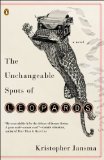Reading Guide Questions

Please be aware that this discussion guide will contain spoilers!
- What do you think is the significance of the title The Unchangeable Spots of Leopards, and how do you think it relates to the novel as a whole?
- In his "Author's Note," how does Jansma set the tone for the remainder of the novel? What themes are introduced to which the story later returns?
- Why do you think Jansma's narrator chooses to conceal his identity behind a long series of aliases? How, if at all, would the novel have been different if the narrator had divulged his real name?
- The narrator posits that the writing of fiction boils down to the ability "to tell lies, for a living," and that "the best novelists make you believe, as you read, that their stories are real" (p. 129, p. 130). Do you believe that a great novelist is, in essence, a highly convincing liar? Or is there something more to great writing than masterfully sustained deception? If so, what?
- The narrator proclaims, "I'm a liar! That's just what I am. I lie like I'm breathing. I lie to everyone, myself most of all" (p. 178). For all his confessed lying, are there truths to be gathered from the narrator's stories? What kind of truth do his lies reveal?
- Colette Marsh appears first in a portrait in the Raleigh Museum of Art that the narrator smudges with his thumb. She surfaces again in the story embedded in chapter four, and her portrait (or one eerily like it) re-emerges at the end of chapter ten. What does Marsh appear to signify in the narrator's mind, and why are the vignettes in which she appears important to the meanings of the novel?
- The characters in the first part of the novel are inseparable. Do you think they make up a classic love triangle?
- Jansma's narrator repeatedly acts as a substitute for someone else—for Betsy Littleford's escort at her deb ball, for Julian at his literary reading, for Professor Wallace at CCNY. How do these substitutions both contribute to and undermine the narrator's sense of identity?
- Readers of novels sometimes expect good characters to be rewarded and bad characters punished. However, the moral mathematics of The Unchangeable Spots of Leopards is not nearly so straightforward. Is it a strength or a weakness of Jansma's novel that its plot does not make a point of punishing evil and rewarding virtue?
- Jansma's narrator appears almost literally to make himself up. How are his self-inventions different, if at all, from the ways in which real people go about defining themselves? How is the narrator's self-creation an ironic commentary on how identity is formed and subverted in the world we live in?
- Julian/Jeffrey makes it big with a "luminous" novel called Nothing Sacred. However, we learn basically nothing regarding what this novel is about. Imagine a plot and some major characters for Nothing Sacred (try to write a few pages of his novel if you're feeling brave) and have a conversation about your version of Julian/Jeffrey's novel.
- Why is Julian so insistent that he and the narrator must never, ever write about each other? Are they too much alike or too different? Might Julian even be another version of the narrator himself?
- Jansma suggests through his narrator "America no longer desires the truth, only the reasonable facsimile thereof. Like battered lovers, we're willing to settle. Our sense of values still holds us to dismiss that which we know, outright, to be blatant lies, but we avoid truth with equal intensity" (p. 121). How valid is this criticism regarding the state of our culture? What do you think needs to be done about it?
Unless otherwise stated, this discussion guide is reprinted with the permission of Penguin Books.
Any page references refer to a USA edition of the book, usually the trade paperback version, and may vary in other editions.

 Book Reviewed by:
Book Reviewed by:





